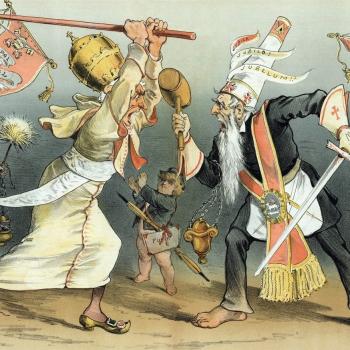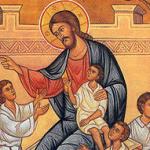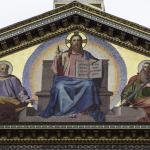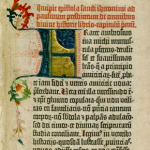In a recent article, I addressed the Protestant doctrine of faith alone, which many believe reflects the source of “doctrinal harmony.” In that article, I showed this position holds some issues, as some Protestants (Unitarians) accept faith alone AND reject the Trinity and Incarnation. To me, this appears as the epitome of disharmony—but I digress.
For this article, I layout the Catholic doctrine of justification by faith as affirmed in the Sixth Session of the Council of Trent (1547). For context, before Martin Luther and Trent, the Church did not authoritatively define justification by faith. Sure, many Church Fathers wrote about justification by faith, and the Church taught justification by faith, however, an authoritative definition only appeared when Luther’s doctrine threatened Church unity. Therefore, if any debate regarding the doctrine of justification by faith existed beforehand, it ceased once the Church authoritatively defined the doctrine.
As an interesting aside, the fact that this “biblical” doctrine, which many Protestants label ‘the heart of the Gospel,” took fifteen-hundred years to fully understand beguiles the mind. What of all those poor souls before Luther? Furthermore, how did the Church fail to understand it before Luther? In other words, how did the gospel survive without its “heart” for almost two millennium?
One last note: please forgive the long quotations. I prefer Trent to speak for itself. However, I do provide a summary at the end. All scriptural support I provide in the hyperlinks.
Trent on Justification by Faith
The Council goes to great lengths to explain its position. The Sixth Session contains sixteen chapters and thirty-three canons. For the sake of space, below I highlight the most relevant sections.
Chapter 1: The Impotency of Nature and of the Law to Justify Man
The holy council declares first, that for a correct and clear understanding of the doctrine of justification, it is necessary that each one recognize and confess that since all men had lost innocence in the prevarication of Adam, having become unclean, and, as the Apostle says, by nature children of wrath, as has been set forth in the decree on original sin, they were so far the servants of sin and under the power of the devil and of death, that not only the Gentiles by the force of nature, but not even the Jews by the very letter of the law of Moses, were able to be liberated or to rise therefrom, though free will, weakened as it was in its powers and downward bent, was by no means extinguished in them.
Summary: Man cannot save himself, either through conscience or the Mosaic Law.
Chapter 2: The Dispensation and Mystery of the Advent of Christ
Whence it came to pass that the heavenly Father, the Father of mercies and the God of all comfort, when the blessed fullness of time was come, sent to men Jesus Christ, His own Son, who had both before the law and during the time of the law been announced and promised to many of the holy fathers, that he might redeem the Jews who were under the law, and that the Gentiles who followed not after justice might attain to justice, and that all men might receive the adoption of sons. Him has God proposed as a propitiator through faith in his blood for our sins, and not for our sins only, but also for those of the whole world.
Summary: In the fullness of time, God came into the world in Christ and redeemed mankind by his blood. Through Christ’s blood, mankind can receive adoption as sons and daughters of God.
Chapter 3: Who are Justified Through Christ
But though He died for all, yet all do not receive the benefit of His death, but those only to whom the merit of His passion is communicated; because as truly as men would not be born unjust, if they were not born through propagation of the seed of Adam, since by that propagation they contract through him, when they are conceived, injustice as their own, so if they were not born again in Christ, they would never be justified, since in that new birth there is bestowed upon them, through the merit of His passion, the grace by which they are made just. For this benefit the Apostle exhorts us always to give thanks to the Father, who hath made us worthy to be partakers of the lot of the saints in light, and hath delivered us from the power of darkness, and hath translated us into the kingdom of the Son of his love, in whom we have redemption and remission of sins.
Summary: Christ died for all, yet not all receive the gift of His salvation. This new birth is only bestowed through the merits of Christ’s passion, “the grace by which they are made just.”
Chapter 6: The Manner of Preparation
Now, they [the adults] are disposed to that justice when, aroused and aided by divine grace, receiving faith by hearing, they are moved freely toward God, believing to be true what has been divinely revealed and promised, especially that the sinner is justified by God by his grace, through the redemption that is in Christ Jesus; and when, understanding themselves to be sinners, they, by turning themselves from the fear of divine justice, by which they are salutarily aroused, to consider the mercy of God, are raised to hope, trusting that God will be propitious to them for Christ’s sake: and they begin to love Him as the fountain of all justice…
Summary: Man’s ability to move towards God comes through grace. The sinner receives justification by God’s grace through redemption in Christ. In turn, fear of God transforms into love of God.
Chapter 7: In What the Justification of the Sinner Consists, and What are Its Causes
This disposition or preparation is followed by justification itself, which is not only a remission of sins but also the sanctification and renewal of the inward man through the voluntary reception of the grace and gifts whereby an unjust man becomes just and from being an enemy becomes a friend, that he may be an heir according to hope of life everlasting.
Summary: Justification remits sin, sanctifies, and renews the inward person. The unjust becomes just and God’s enemies becomes His friends. (The overall passage is lengthy. Please follow the link above to read the full chapter).
Chapter 8: How the Gratuitous Justification of the Sinner by Faith is to be Understood
But when the Apostle says that man is justified by faith and freely, these words are to be understood in that sense in which the uninterrupted unanimity of the Catholic Church has held and expressed them, namely, that we are therefore said to be justified by faith, because faith is the beginning of human salvation, the foundation and root of all justification, without which it is impossible to please God and to come to the fellowship of His sons; and we are therefore said to be justified gratuitously, because none of those things that precede justification, whether faith or works, merit the grace of justification. For, if by grace, it is not now by works, otherwise, as the Apostle says, grace is no more grace.
Summary: The above represents the authoritative teaching on justification espoused by the Catholic Church and held in “uninterrupted unanimity.” All believers are justified by faith, not by works. Furthermore, nothing merits “the grace of justification.”
Interlude
Moreover, I offer an interlude here to mark a point that many, especially Reformed Calvinists, consider an affront to God’s grace: that one may lose, through an act of free choice, salvation attained through genuine faith. Calvinists refer to this doctrine as perseverance of the saints. The Catholic Church, as Trent explains, rejects this doctrine as a sin of presumption. Below, Trent goes on to clarify in what it calls “the vain confidence of heretics.”
Chapter 9: The Vain Confidence of Heretics
But though it is necessary to believe that sins neither are remitted nor ever have been remitted except gratuitously by divine mercy for Christ’s sake, yet it must not be said that sins are forgiven or have been forgiven to anyone who boasts of his confidence and certainty of the remission of his sins, resting on that alone, though among heretics and schismatics this vain and ungodly confidence may be and in our troubled times indeed is found and preached with untiring fury against the Catholic Church. Moreover, it must not be maintained, that they who are truly justified must needs, without any doubt whatever, convince themselves that they are justified, and that no one is absolved from sins and justified except he that believes with certainty that he is absolved and justified, and that absolution and justification are effected by this faith alone, as if he who does not believe this, doubts the promises of God and the efficacy of the death and resurrection of Christ.
The above references Canons 12, 13, and 14 of the council. These state:
Canon 12. If anyone says that justifying faith is nothing else than confidence in divine mercy, which remits sins for Christ’s sake, or that it is this confidence alone that justifies us, let him be anathema.
Canon 13. If anyone says that in order to obtain the remission of sins it is necessary for every man to believe with certainty and without any hesitation arising from his own weakness and indisposition that his sins are forgiven him, let him be anathema.
Canon 14. If anyone says that man is absolved from his sins and justified because he firmly believes that he is absolved and justified, or that no one is truly justified except him who believes himself justified, and that by this faith alone absolution and justification are effected, let him be anathema.
Summary: Here, the issue concerns ungodly confidence (a presumption) that one is fully justified, and that this confidence provides means by which one receives remittance of sins. Trent here calls this formulation of justification that focuses on one’s own confidence and certainty faith alone. Now, some Protestants may disagree with this understating of faith alone as confidence and certainty alone.
Final Thoughts…
In the above, I lay out the view of justification as espoused by the Council of Trent. The Catholic Church teaches that salvation comes by grace through faith, not by works. The admonition against faith alone focuses on confidence and presumption. One cannot presume God’s mercy nor unrealistically underestimate the weakness of human nature. This weakness I address in my next article on the Council of Trent concerning justification’s relationship to sanctification and further explore one’s ability to freely lose salvation.
Thank you!
Read The Latin Right’s other writing here.
Please visit my Facebook page and IM your questions (and follow my page) or topics for articles you would like covered.
Also, please subscribe my YouTube page for updates on upcoming articles.


















